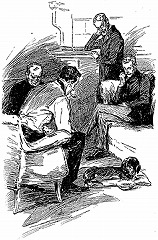“Precisely so,” answered Holmes. “Now would you mind going down and fetching that poor little devil of a terrier which has been bad so long, and which the landlady wanted you to put out of its pain yesterday?”
I went downstairs and carried the dog upstairs in my arms. Its laboured breathing and glazing eye showed that it was not far from its end. Indeed, its snow-white muzzle proclaimed that it had already exceeded the usual term of canine existence. I placed it upon a cushion on the rug.
“I will now cut one of these pills in two,” said Holmes, and drawing his penknife he suited the action to the word. “One half we return into the box for future purposes. The other half I will place in this wineglass, in which is a teaspoonful of water. You perceive that our friend, the doctor, is right, and that it readily dissolves.”
“This may be very interesting,” said Lestrade, in the injured tone of one who suspects that he is being laughed at; “I cannot see, however, what it has to do with the death of Mr. Joseph Stangerson.”
“Patience, my friend, patience! You will find in time that it has everything to do with it. I shall now add a little milk to make the mixture palatable, and on presenting it to the dog we find that he laps it up readily enough.”

As he spoke he turned the contents of the wineglass into a saucer and placed it in front of the terrier, who speedily licked it dry. Sherlock Holmes’s earnest demeanour had so far convinced us that we all sat in silence, watching the animal intently, and expecting some startling effect. None such appeared, however. The dog continued to lie stretched upon the cushion, breathing in a laboured way, but apparently neither the better nor the worse for its draught.
Holmes had taken out his watch, and as minute followed minute without result, an expression of the utmost chagrin and disappointment appeared upon his features. He gnawed his lip, drummed his fingers upon the table, and showed every other symptom of acute impatience. So great was his emotion that I felt sincerely sorry for him, while the two detectives smiled derisively, by no means displeased at this check which he had met.
“It can’t be a coincidence,” he cried, at last springing from his chair and pacing wildly up and down the room; “it is impossible that it should be a mere coincidence. The very pills which I suspected in the case of Drebber are actually found after the death of Stangerson. And yet they are inert. What can it mean? Surely my whole chain of reasoning cannot have been false. It is impossible! And yet this wretched dog is none the worse. Ah, I have it! I have it!” With a perfect shriek of delight he rushed to the box, cut the other pill in two, dissolved it, added milk, and presented it to the terrier. The unfortunate creature’s tongue seemed hardly to have been moistened in it before it gave a convulsive shiver in every limb, and lay as rigid and lifeless as if it had been struck by lightning.
Sherlock Holmes drew a long breath, and wiped the perspiration from his forehead. “I should have more faith,” he said; “I ought to know by this time that when a fact appears to be opposed to a long train of deductions, it invariably proves to be capable of bearing some other interpretation. Of the two pills in that box, one was of the most deadly poison, and the other was entirely harmless. I ought to have known that before ever I saw the box at all.”
This last statement appeared to me to be so startling that I could hardly believe that he was in his sober senses. There was the dead dog, however, to prove that his conjecture had been correct. It seemed to me that the mists in my own mind were gradually clearing away, and I began to have a dim, vague perception of the truth.